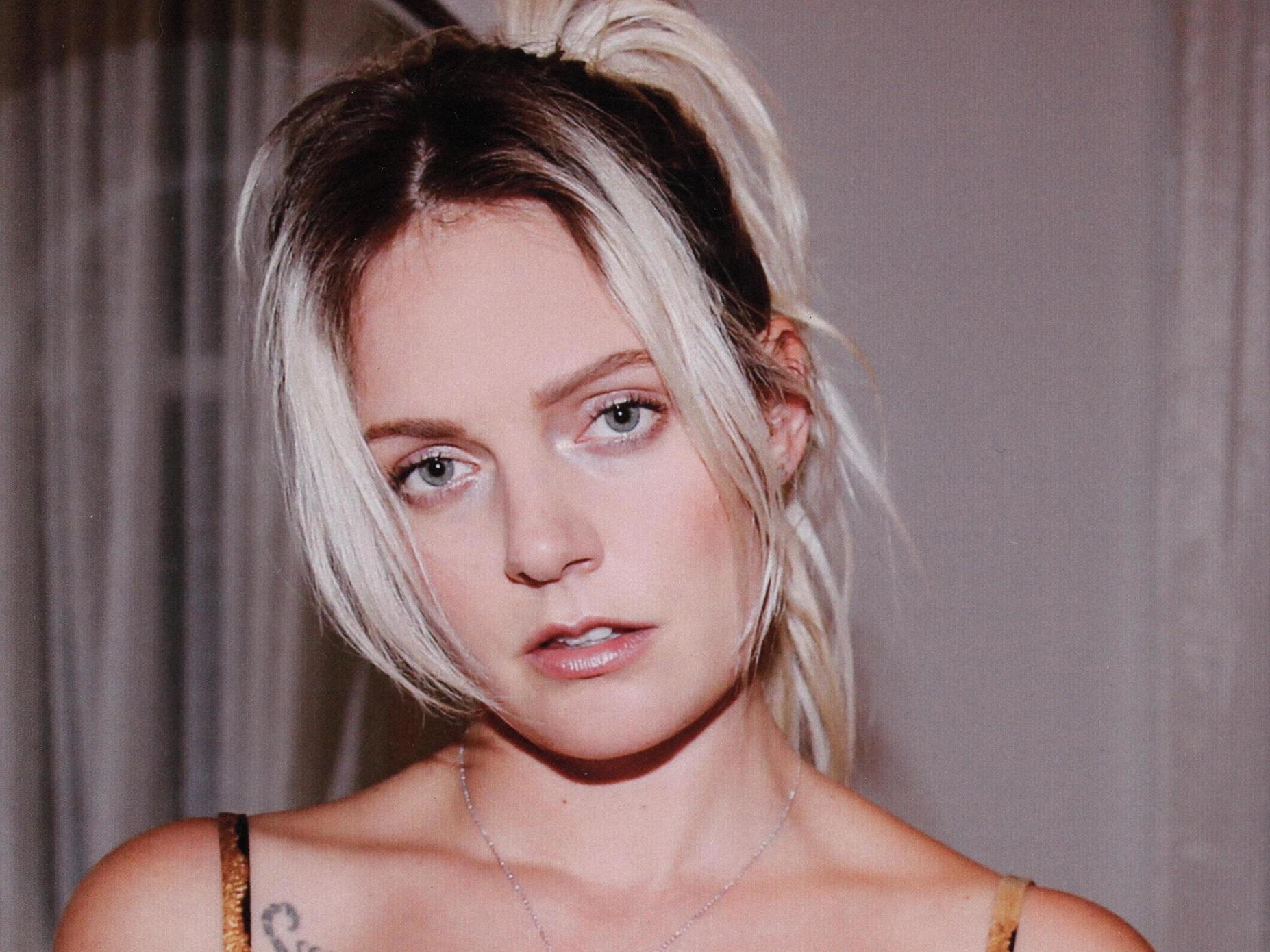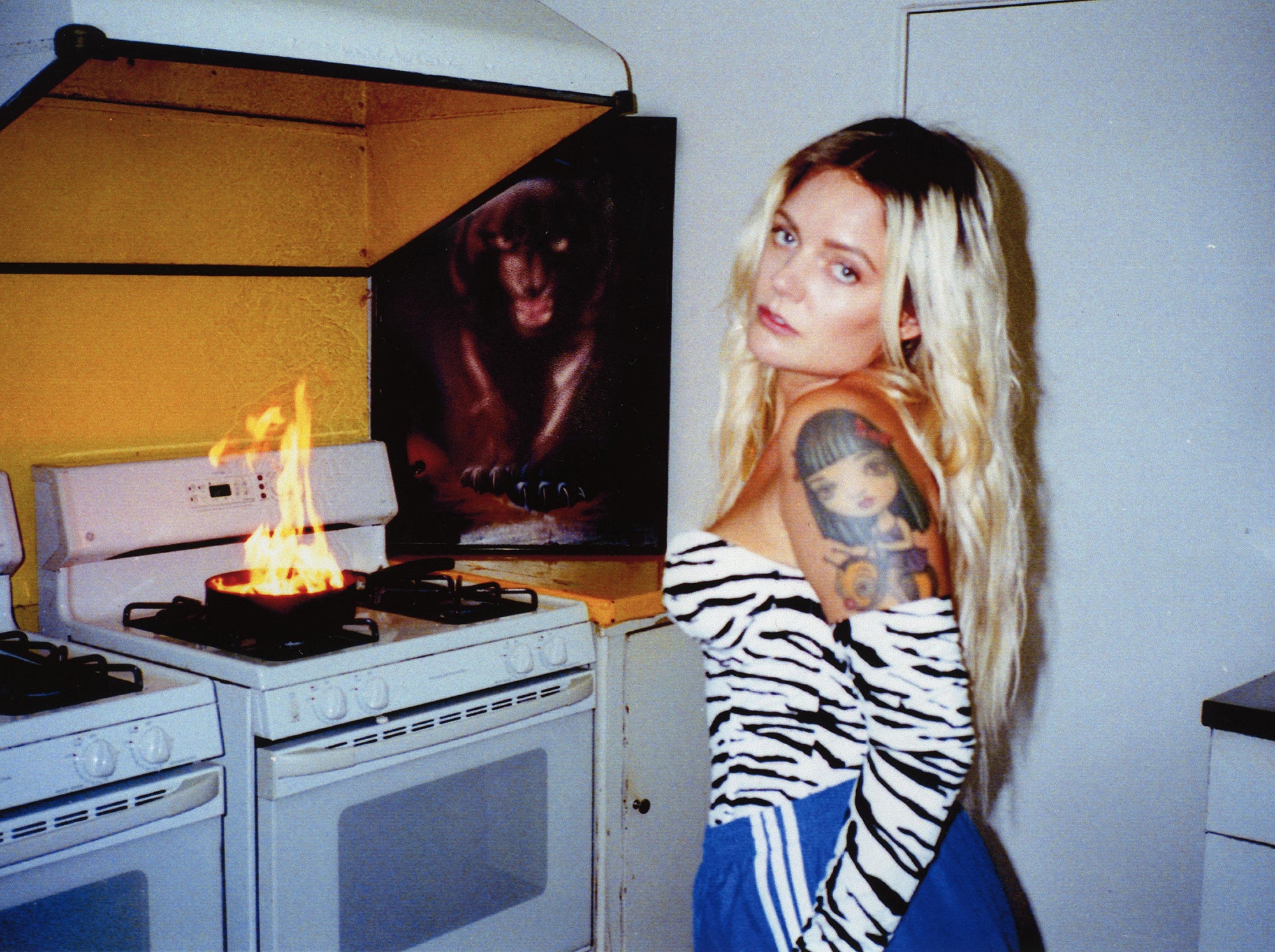Tove Lo: ‘I don’t need to be unhappy to write good songs’
Pop’s foremost storyteller of Gen-Y dysfunction talks to Adam White about sex, depression and why she’s finally in balance with her ‘semi-crazy side’


Tove Lo deals in absolutes. The Swedish singer-songwriter is blunt, not only about sex, drugs and female desire, but about her bad decisions and self-destructive thoughts. Even her coffee order is extreme. “Can it be burning hot?” she asks the waitress. “I need it to burn.”
Reclining on a sofa in a high-end London hotel, Lo has the look and presence of a Seventies rock star, tall and striking, wrapped in a black leather jacket, her hair dip-dyed blue. But the 31-year-old is also warm and amiable, far removed from the often blurry-eyed nihilism of her music videos, as if writing so many songs about her own fears and anxieties has proven therapeutic.
In 2014, Lo’s drug-fuelled emotional breakdown bop “Habits (Stay High)” became a sleeper smash, cementing her status as an unflinchingly intimate storyteller of Gen-Y dysfunction. Hers is a propulsive, grungy sound, one that doesn’t so much blare as sweat, conjuring images of sliding up against one too many bodies on the dancefloor. But in the five years since the release of “Habits (Stay High)”, she has found herself being handed a specific persona in the press: that of a wild and unpredictable exhibitionist.
“I always found it funny,” she says now. “It started out like, ‘You’re this trashy party girl who is a bad influence – how does that feel?’ And then I would always get these questions about being body positive, being open about my sexuality, open about drug use, all that stuff, and I’m sitting there like, ‘OK, we’ll talk about that for two questions and then the rest would be about music’, but the headline would always be ‘Yes, I’ve done drugs’ or ‘Yes, I like my body’, or ‘Yes, I’m bisexual’ or whatever. I’ve just embraced it now. I wouldn’t want to change my expression or get rid of those sides of myself just because I’m frustrated with the narrative.”
It’s a narrative that changes from place to place, she says. If the US and UK press has been fixated on her graphic lyrics or penchant for onstage nudity, the rest of Europe has made a fuss about the occasional drug reference in her music. “When I’m in Sweden, all they ask me about is drugs because it’s so very, very harsh there about drugs in general. All outlets take a stand against it. Which I’m fine with – I think it’s good to stand for something. They don’t want the slightest risk that any young listeners think that it’s cool to take drugs, but that’s not what I’m saying, though. Ever. But I’m also not lying, I’m just talking about my life.”
There is a noticeable split between the tracks Lo keeps for herself and those she writes for other artists. Those, like Ellie Goulding’s “Love Me Like You Do” or Zara Larsson’s “Don’t Worry Bout Me”, tend to be breezy and feather-light, all fairytale euphoria and happy endings. But Lo’s own are almost anti-fantasy, reflective of hurt feelings and deep wells of insecurity, even when things are going well. On “Mistaken”, one of the highlights of Lo’s new album Sunshine Kitty, she lies awake at night terrified that her lover doesn’t feel the same way about her as he did his ex. “I think you love the way you looked together, maybe I’m mistaken/ I can tell myself it doesn’t matter, but it’s hitting my heart”. On “Really Don’t Like U”, a seductively sparse duet with Kylie Minogue, she guiltily judges her ex-boyfriend’s new love, purely out of spite.
“If a song is just 100 per cent ‘everything is perfect’, I can’t relate to it, and I can’t feel it,” Lo explains. “It might be fun and cool but it doesn’t touch me or resonate with me in any way. I think it’s because if you’re in a really amazing situation where everything is great, there’s always that little hint of fear that it’s all gonna go away. Nothing is static when it comes to emotions.”
Since she was nine years old, Lo has kept a journal, writing down thoughts that eventually became poems and then song lyrics. Her childhood in the suburbs of Stockholm was superficially idyllic – she was the daughter of an entrepreneur father and a psychologist mother. But she found herself struggling with anxiety and depression. That she had everything other people thought she needed only made her more uncomfortable.
“I remember just being, ‘Everyone’s smiling and happy, and I’m smiling but I’m not happy.’ And it was so exhausting faking it,” she says. “I had that feeling of, ‘I don’t have any problems. Why am I sad? I have a great family, I have a roof over my head, I have a dog, I have friends.’ And I would get pissed at myself for being sad.”
While her familial wealth doesn’t diminish her experiences with depression, she says that she has always been aware of the privilege she has been afforded. And it extends to her sexuality, too. She is often asked for advice by young fans on how they should come out to their parents, she explains, but that she tends to demure, reasoning that it’d be “dangerous” for her to answer. “I grew up in a super-liberal family,” she says. “I never even came out to my parents because there was never any thought in my mind that because I was making out with girls, that was bad. And because I still liked boys, it was more, ‘I don’t know what this is.’ I didn’t even define myself for a long time because I didn’t feel like I had to, I didn’t need to.
“So for me to talk about that when people have such different upbringings and experiences, I think it’s a dangerous thing for someone who had it very easy to speak out on. Because I didn’t have the experience that a lot of kids have, where it’s extremely tough.”
As a teen, she developed a “crazy fascination and love” for Nirvana, but it was Kurt Cobain’s wife, Hole frontwoman Courtney Love, who had the most profound impact on her. Love was both adored and vilified, merging a punk ethos with radio-friendly pop hooks, her lyrics soaked in caustic wit and brutal honesty. Her frankness when it came to body image, fame and feminism, specifically on Hole’s seminal 1998 record Celebrity Skin (“That album was my everything,” Lo says), can all be found in Lo’s own material.
“It was sadness and darkness written with humour and with sass,” Lo remembers. “I think that really resonated with me, and the honesty about darkness in shiny, plastic situations. Growing up in quite a posh area, I would feel that so much. Everything is clean and perfect, and everyone is looking clean and perfect, but it’s still a miserable vibe here.”
Having fallen in love with music and songwriting, Lo enrolled in the prestigious Rytmus music school in Stockholm, where she became close friends with Caroline Hjelt, later one half of “I Love It” duo Icona Pop. They would go on to work the same local pop scene together, before an A&R spotted Lo and invited her to Los Angeles, where she began to collaborate with the ubiquitous Swedish producer Max Martin, and write tracks for Girls Aloud, Lea Michele and The Saturdays.
But while Martin mentored her as a songwriter, Lo was discreetly releasing her own music on the side, her lyrics deliberately deconstructing the coy metaphors and coded language that dominated his work with the likes of Britney Spears, Backstreet Boys or Taylor Swift. Her debut album, 2014’s Queen of the Clouds, released on the back of the success of “Habits (Stay High)”, was met with critical and commercial success. Two more albums, Lady Wood and Blue Lips, expansive concept pieces split into chapters and accompanied by short films, followed.
But her past successes didn’t come about through the healthiest of creative processes. “I’ve always written from a space of chaos,” she explains. “I wanted to create this world for my fans and make a double album and it was a big effort that I’m so proud that I followed through with, but it was also because I’d just been through some s***. I take on these massive projects because to create stuff is how I work through things. It’s a very personal need.”
As well as undergoing surgery in 2015 after potentially voice-destroying cysts were found on her vocal chords, Lo says it took her many years to feel comfortable in the spotlight.
“I didn’t feel at home in the life of being an artist,” she explains. “Being a person in the public eye, and being a person that someone has opinions about in general. Getting used to being away from my family and my friends and them being used to it, and being worried about my voice.”

She has grown better since. She’s now based in Los Angeles, a city she has come to love, and has been in a healthy relationship for more than a year. For a while, such personal ease led her to believe Sunshine Kitty was happier than the records that came before it. But she’s lately come to realise that’s not strictly true.
“When I listen to it, I notice there’s still quite a lot of sadness there as well,” she says. “But I think I felt that way because I was writing it from a calmer and happier place. I remember I was kind of like, ‘How do you write when you’re just in a good space?’ Like what do you grab your inspiration from? But it was cool to see that I don’t need to be in chaos to write, and that I don’t need to be unhappy to make good songs. I’ve always been quite vulnerable in my songs but I think the difference is there’s an acceptance now or like a love for being vulnerable instead of being angry about being vulnerable.”
After so many years of struggling with herself, and feeling drawn to chaos and emotional upheaval, has she finally found some kind of balance? There’s a pause.
“Uh... no.” She laughs. “I feel I’m as balanced as a person who is like me can ever be. I’ve always had sections of depression in my life, but I think now – I’m very emotional still, I can be very up and down, but it passes, and I know that it passes. So I let myself cry out of nowhere and people around me are like, ‘What’s happening?’ But I tell them, ‘Just ignore me, it will pass!’ Or I’ll throw s*** around or yell, but I try to do that in private so I don’t freak people out too much. But I let myself feel it, because I know it will pass. I’m in balance with my semi-crazy side. I’m in tune with it.”
She lets out a cathartic sigh. The burning hot coffee, the one she went to pains to specifically request an hour before, has sat untouched, and is now at room temperature. Maybe she’s mellowed more than she thinks.
Sunshine Kitty is released on 20 September
Join our commenting forum
Join thought-provoking conversations, follow other Independent readers and see their replies
Comments
Bookmark popover
Removed from bookmarks